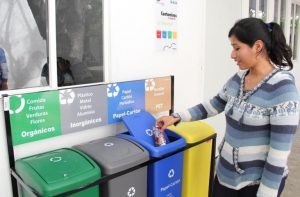Improving your recycling habits is easier than it seems, and each small effort adds up to caring for our planet. Here are four easy ways to recycle your waste:
1. Know and separate your waste correctly
Understanding which materials are recyclable and how they should be separated is essential:
-
Learn about local regulations: Recycling rules may vary depending on the city or country. Some programs accept certain plastics or glass, while others do not. Check the guidelines provided by your municipality or waste collection company.
-
Use differentiated containers: Have separate containers at home for paper, plastic, glass, metals and organic waste. Label them clearly to facilitate the process.
-
Avoid cross-contamination: Do not mix recyclable materials with general waste. A single inappropriate waste can contaminate an entire batch, causing everything to end up in the landfill.
2. Clean and prepare materials before recycling
Clean materials are more easily recyclable and avoid issues at the recycling plants:
-
Rinse the containers: A quick rinse to remove food scraps or liquids is sufficient. No need to use a lot of water or energy.
-
Dry the materials: Make sure the waste is dry before placing it in the container. Moisture can hinder the recycling process and attract pests.
-
Crush and compact: Crush plastic bottles and cardboard boxes to save space in your container and in the collection trucks.
3. Reduce and reuse before recycling
The best way to manage waste is by avoiding generating it:
-
Opt for products with less packaging: Choose bulk products or those with recyclable or biodegradable packaging.
-
Use reusable bags: Replace single-use plastic bags with cloth bags or durable materials.
-
Give a second life to objects: Before discarding something, think if you can reuse it. Glass jars can be used for storage, and old clothes can become rags or craft projects.
4. Actively participate and educate others
Change is more effective when it is collective:
-
Share knowledge: Talk to friends, family, and neighbors about recycling practices. You can learn new tips and spread the ones you already know.
-
Get involved in the community: Participate in local recycling programs, public space clean-ups, or sustainability workshops.
-
Educate the new generations: Teach children and young people the importance of recycling and how to do it correctly. They are the ones who will inherit the planet.
By adopting these simple actions, you not only improve your environmental impact but also inspire others to do the same. Recycling is a key element in building a sustainable future, and every gesture counts.
Extra Tip: Consider starting a small composter at home for your organic waste. It’s easier than it seems and produces an excellent <strong


